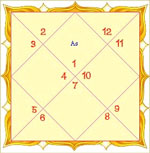 हिन्दी में पढने के लिये यहाँ क्लिक करें
हिन्दी में पढने के लिये यहाँ क्लिक करेंAstroSage has had a successful run with its many popular features. We, at AstroSage, thank you for making us the #1 Astrology Portal in India. In return for all this love and respect, we strive hard to offer the best services to you. In series of our endeavor, we have come up with something really exclusive for all our Hindi users. AstroSage is now available in Hindi!
Click here to View Astrosage in Hindi - hindi.astrosage.com
Indeed, it is awesome for all those who are more comfortable with Hindi. Especially, when it comes to reading the PDF of Kundali (Birth Chart) Predictions, it sometimes gets difficult to understand for those who are not comfortable in English. So, a special treat for Hindi speaking users - The PDF is also now available in Hindi!
Print 32+ pages Kundli in Hindi as well
 Now, let’s jump to another good news. As AstroSage is more about freewares, here
is another update for you. The AstroSage Kundali
is now available in more detail. Now, the PDF is at least 32 pages long both in
English as well as Hindi. So, the next time you will make your Kundali or Birth
Chart, it will be more detailed!
Now, let’s jump to another good news. As AstroSage is more about freewares, here
is another update for you. The AstroSage Kundali
is now available in more detail. Now, the PDF is at least 32 pages long both in
English as well as Hindi. So, the next time you will make your Kundali or Birth
Chart, it will be more detailed!
Apart from this, you also get an option to choose the topics that you want. If you don’t want the print of entire detailed report, you can now select the areas of your interest. Just mark the checkboxes of the topics you want and click Print button.
Click here to get started with your Kundli Making - AstroSage Kundli
Blogs Of AstroSage
 Ever since the first blog got published, the feedback and interest people showed
is incredible. The topics that are chosen have been gaining popularity for its content
and standard of writing. The best part is - you get these blogs in English as well
as Hindi.
Ever since the first blog got published, the feedback and interest people showed
is incredible. The topics that are chosen have been gaining popularity for its content
and standard of writing. The best part is - you get these blogs in English as well
as Hindi.
- AstroSage’s English Blog - astrology.astrosage.com
- AstroSage’s Hindi Blog - jyotish.astrosage.com
Many of AstroSage’s mobile applications have this facility of Blog notifications. You can start off by downloading our most popular Android application AstroSage Kundli. With this, you will automatically start getting Blog notifications on your mobile phone.
Click here to download the Android App - Astrosage Kundli
Now, let’s move onto other important things for the week. Like always, we have the horoscope predictions ready for you. Just click here to reach them -
Coming to the important events of the week. Lets see what this week has in store for everyone.
- 14th October - Vijayadashami or Dussehra, Vidyarambham Day
- 15th October - Papankusha Ekadashi
- 16th October - Pradosh Vrat
- 17th October - Tula Sankranti
- 18th October - Kojagara Puja
- 19th October - Sharad Purnima
- 20th October - Month of Kartik starts
- Vidyarambham Day Special: Education Service
“You can never be overdressed or overeducated.” ― Oscar Wilde
Education has always been the most important aspect of one’s life. Astrology is very much used when it comes on Education & Career. Keeping this significant part of your life in mind; we would like to introduce our service on education.
- Click here - Education Service
Education and career are two inter-related subjects. So, you may like to try our service on career and job.
- Click here - Career / Job
So, this is enough for the week. Hope you have a wonderful time ahead. Stay tuned to AstroSage for more informative stuff.


